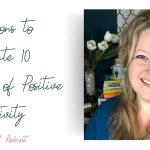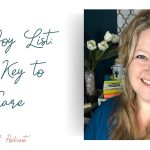If you have been feeling stressed out, then you picked the best episode to listen to because we’re talking about reducing stress in fun and doable ways. Today I have ten tips to help you stress less and if you’ve been listening to the show for awhile, some of them may sound familiar.
I’ve been doing episodes about stress since the very beginning of the podcast to help you understand the scientific nature of our stress response and what we need to know about our stress in order to live better lives with it, because stress isn’t going away! I’ve invited guests to share different ways to reduce the negative aspects of stress and I’ve done episodes to show you the connection between stress and things in our lives like clutter. I’ve even shared how stress can actually help us perform better.
All of these episodes can be found on the Stress Management playlist on the podcast page and if you use Spotify, I have created a playlist there as well. My account is Positively_Lisa, just like on Instagram where I share these playlists to my stories and save them in the PODCAST highlights. Be sure to follow me on Instagram for these updates.
Are you ready for 10 simple tips to help you stress less? Before we go through the list, I want to reassure you that you can access this list so you don’t have to scramble to write it down. This is especially important if you’re driving. Listen with me the first time and then maybe repeat this section and then you can check out the PODCAST page and the blog post that links to this episode and you can request a printable and infographic image of these items with their summaries for you to reference.
Here are your 10 Tips to Stress Less:
1. Get Active
Exercise relaxes muscles and triggers endorphins, which improves your mood. This doesn’t have to mean the “E” word. Exercise is great, but almost any form of physical activity can act as a stress reliever. It’s not about being athletic. It’s about moving your body so those feel-good chemicals, like endorphins, can boost your sense of well-being.
Activity can also help you refocus your mind. It’s a healthy distraction. If you’ve ever rage-cleaned and felt better, you have lived this example. I think one of the simplest and most effective would be taking a walk, especially outside. If you can see some nature while you’re at it, you’re on your way to less stress.
2. Laugh More
Finding joy and humor in life does so much for us. It helps release built up tension and it triggers the release of endorphins–those happy chemicals I will keep mentioning. Laughter is a physical boost for your body because it encourages you to breathe more and it’s delightfully distracting.
Laughing at your circumstances can also offer a silly reframe to an otherwise frustrating situation, giving you a chance to get some distance and perspective and maybe come at a problem in a new way. As a bonus, it’s usually contagious in the best way, which means you can help others while you chuckle away the stress.
If you want to keep laughing, stick with me. Humor is high on my core values list and my character strengths, so I am dedicated to making you laugh…often unintentionally! Also, if you’d like another episode to check out that speaks to this, my interview with Lisa David Olson on reducing stress through humor is just the thing. You’ll hear me do improv…poorly…and that alone might be worth tuning in. You’ll find this in the stress management playlist.
3. Nourish Yourself
What we consume impacts our health and influences our energy, mood, and our ability to recover. From a physical standpoint, eating a healthy diet is an important part of ensuring you have the stamina you need to handle stressors, but it can also reduce stress as part of the process. Eating well can be a confidence boost. It can boost endorphins and energy.
There are specific foods that can actually reduce stress as well. For example, foods high in Vitamin C can help you regulate cortisol and blood pressure, which spike when you’re stressed. So that bowl of berries isn’t just a yummy treat, it’s a way to help you reset.
While we’re talking about what we consume, may I remind you that there is so much we digest every day that isn’t food that still impacts us. Social media, the news, and the weight of other peoples’ opinions. Please be selective about what you let in.
4. Meditate
A proven stress reduction technique, this practice calms the mind and body. During meditation, especially if it’s guided, you focus your attention elsewhere. And even if you can’t quiet your mind, it promotes slowing down and methodical breathing and is proven to calm your body physically. We’ve talked about many different ways to meditate (and why you’d want to) on the podcast.
You can practice guided meditation, mindfulness, visualization and other forms of meditation anywhere at almost any time. For example, you could practice mindful meditation while taking a walk, or do something completely different like using creative expression to meditate, which is something I talked about with artist Jen Faye in episode 184.
5. Say No
Healthy boundaries are essential to protect your energy and give you peace of mind. Saying yes may seem like an easy way to keep the peace and prevent outer conflicts, but instead you may find you cause more inner conflict because your needs aren’t being met and your limits aren’t being honored. It’s a quick way to exhaustion and burnout and resentment. Learning to say no or being willing to delegate can help you manage your to-do list and your stress.
Remember that even too much of a good thing you want to do can cause you stress, which in the short term might work, but in the long term causes the same issues as any other chronic stressor. You’ll find an episode on the stress management playlist that I did recently on why saying no is a must. I encourage you to check it out because it also has support for you if you struggle to say no.
6. Tune in (Listen to Music)
The Doobie Brothers called it! You gotta listen to the music. Listening to or playing music can provide a mental distraction, lessen muscle tension, and lower stress hormones. The benefits of music have been studied significantly, but I think we know anecdotally as well how wonderful it can be to distract us and reset us.
I am partial to it as a musician, but even if you aren’t, you know the feeling of turning on a tune you really love and cranking it up to drown out a tough day and remember a better time. Maybe it reminds you of a core memory, making you sing loudly and off-key. Either way, it works. If you check out the playlist, be sure to look for the episode with Tim Ringgold, who is a board-certified music therapist. He shares some surprising ways music can heal.
And if you’d like some fun playlists to lift your spirits, I have a few Spotify playlists of songs I’ve collected from podcast guests over the years. I include a link in the show notes each episode and you can also find the playlist on my Postively_Lisa profile on Spotify.
7. Rest
Rest is necessary for healing and growth. Sleep can affect your mood, energy level, focus, and overall functioning. It can increase stress and decrease stress depending on how much you get and the quality of it. In episode 131 I chatted with Gary Ware about how to manage stress through rest and play, and we covered so much more than sleep.
If you struggle with things like napping and getting proper sleep, keep working on that. But you’ll appreciate his approach to different options for rest. As long as you can get to a point of allowing your body to calm and stand down, that kind of rest will make a difference in reducing stress.
8. Journal
Release your thoughts and concerns so you can breathe and create space for processing. When we keep things bottled up, we build the stress up. When you release what’s bothering you, it’s like opening the pressure cooker valve aka “letting off stream”. You can do this with friends you trust and with professionals, of course.
Journaling can be helpful because it’s instant and private and it helps you document. Sometimes our memory can mess with us so when you’re in the moment, it can be helpful to capture something to process later. If you’re curious to know more, check out episode 158 where I share the benefits of therapeutic journaling. I’ve included it in the stress management playlist as well.
9. Connect
Social contact is a good stress reliever because it can offer distraction and support. When you’re stressed and irritable, you may want to isolate yourself. I get that introverts especially want to do this; I get it because it’s my stress response as well.
Go ahead and take the time you need, and use it to journal and do some of the other tips. But don’t stay isolated too long. Even one good friend who listens can make a difference. And if you want to get more out of connecting with others, try volunteering and help yourself while helping others.
10. Seek Help
It is not a weakness to need help. It is an act of wisdom and courage to seek it. Ask friends specific ways they can support you. And if you feel overwhelmed or trapped, if you worry a great deal and you can’t seem to shake it, or if your stressors make it difficult to achieve your daily tasks at work or school, you may want to consider therapy.
Professionals can help you understand the sources of stress and why it all seems to be too much for you, and provide the right tools for you to cope. They can pave the way for you to process and heal.
If you’re like me, you could use a visual of this list for reference. I have an infographic and printable file of this list that you can request at https://positivelyproductive.com/stress and I’d be happy to send it.
The concepts are simple and have a lot of leeway to make them work for you and fit your style, which is what I’m all about here. You’ll find many episodes about these that can give you more ideas.
As I mentioned before, the stress management playlist has all the stress-related episodes, but you can also use the search bar on the PODCAST page of the PositivelyProductive.com website to find related topics like meditation, journaling, and more.
Don’t let this overwhelm you. This is to help you stress less, so the first thing you want to do is to choose ONE idea from this list to start and make it your own.
Give it a try and see what happens. I’d love to hear how it goes.











